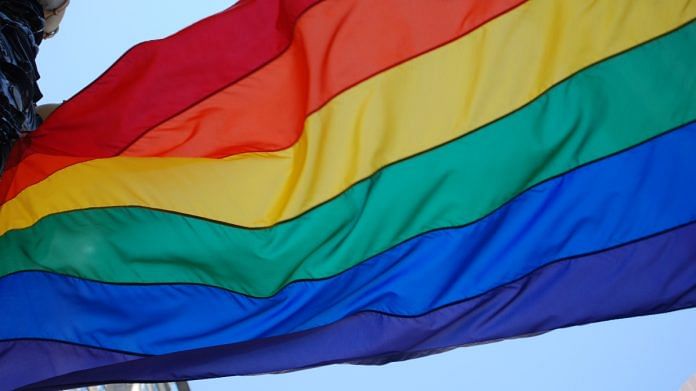The latest season of Hindi-speaking Indians’ favourite show Bigg Boss is out — but it lacks ‘pride’.
The 15th season of the reality TV show, which has brought tremendous fame to many stars from the small screen, has been missing LGBT+ characters for quite some time. The Supreme Court struck down part of the Section 377 of the IPC that criminalised homosexuality in 2018. But Bigg Boss has missed featuring an openly gay, out-and-proud person its show, which is saddening.
An insider’s view into gay lifestyle: Bigg Boss through the seasons
Bigg Boss is inspired by the Dutch TV show Big Brother based on a concept similar to George Orwell’s novel Nineteen Eighty-Four and its highly popular adage “Big Brother is Watching You”. A bunch of celebrities live in a lavish house with each move watched and broadcast by Bigg Boss via cameras.
The contestants have to perform interesting tasks and engage in politics to protect themselves from elimination. However, that is not something I switched on to when I was a kid. The first season featured Bobby Darling (Pakhi Sharma) who I only had seen in movies for sultry references. It was the first time I was exposed to an out-of-closet gay, watching how they live and behave outside the sets. It was something I was extremely curious to know as a growing teenager.
Bobby was evicted in the first week and there was no gay character in the second season. In season 3, came fashion designer Rohit Verma. He stayed for about 7-8 weeks and spoke about transsexuality, giving a bit of clarity on who a trans person is. Perhaps it is significant that this season was aired in 2009 while I was still a school-goer. My access to the Internet was limited and newspapers seldom published any educational material on the issue.
The third season of Bigg Boss was boring, thanks to its venerable host Amitabh Bachchan who failed to spice it up. But as the seasons rolled in, the LGBT+ representation kept improving.
In the fourth season hosted by Salman Khan, there was a short appearance of Ali Saleem, a Pakistani celebrity famous for portraying his alter ego, Begum Nawazish Ali. As Begum, he would crossdress and gossip about a variety of issues. While Ali was getting ready for a small chat show with fellow contestants, a passing comment said, “Begum dadhi bana rahi hai (the empress is shaving).”
In the next season came trans rights activist Laxmi Narayan Tripathi, who is now a bigger celebrity than before, especially in the trans world. Laxmi was perhaps one of the first such celebrities featured on mainstream TV without any objectification. Back then, there was no Netflix in India where we could see more representation of the community in a non-homophobic or non-transphobic way.
In season six, the level of spice revved up as fashion designer Imam Siddiqui brought in much-needed drama. To my knowledge, he has been the most entertaining character in the house. As a teen, I would often hear girls use his catchphrases “zip-it” or “time-out” as tantrums and conversation stoppers.
In subsequent seasons, we did see VJ Andy, Mr Gay India 2014, Sushant Divgikar and naked Yoga guru Vivek Mishra. By then, I was 18 and had access to more digital streaming platforms with private Internet. So, my thirst for watching LGBT+ content was no longer being quenched by Bigg Boss.
Also read: It’s Pride Month and on Netflix, Hotstar, LGBTQ stories are growing. Here’s a checkout list
Disappearance of LGBT+ contestants a sad state of affairs
However, such gay characters now seem to have disappeared from the show. In the 11th season, we did see Odisha TV host Sabyasachi Satpathy, who identified himself as a bisexual. Later on, he went to announce that he might be featured in a “Gay Swayamwar”, something like The Bachelor show in America, but it never materialised.
There were small incidents in the same season when producer Vikas Gupta’s sexuality was questioned, but he came out publicly in 2020 only via Twitter. What’s stranger in the latest seasons of Bigg Boss is that despite the efflux of the homophobic laws, the influx of people who wear their sexuality on their sleeves with pride has almost become invisible at a time when more people are coming out of the closet.
Being gay is still a big taboo in Bollywood. A casual chat with a film editor revealed that people in the industry consider homosexuality as a bad tag. If labelled gay, they will no longer be invited at parties, their share of movies will decline and their struggles would just rise. Bigg Boss was a platform where many people achieved success and became popular stars.
But the struggles of the LGBT+ community increase manifold while contesting the show. Most of the time, there will only be one gay character who will befriend women, ruling out any possibility of gay romance. Unlike straight contestants where in-house romance garners more TRP and becomes a talking point among the audience, gay romance may do the opposite. People behind TV desks once told me that whenever there is gay content being aired on national TV, people tend to switch the channel to watch something else, as if it was a condom ad streaming.
Also read: How Covid spelled doom for LGBTQI+ characters on TV
Indian TV shows have miles to go
So, was Bigg Boss giving consolation prizes to homosexuals in the past and stopped fielding LGBT+ people now that it is more competitive? Indian television offers the worst in the name of soaps, including comedy where homophobia and transphobia are common and a better representation of LGBT+ characters remains a distant dream.
Bigg Boss could have made that difference, but it chose not to. I really hope things change and LGBT+ people are brought through wild card entries. This can reignite the conversation about sexuality in our drawing rooms.
Views are personal.
(Edited by Humra Laeeq.)



